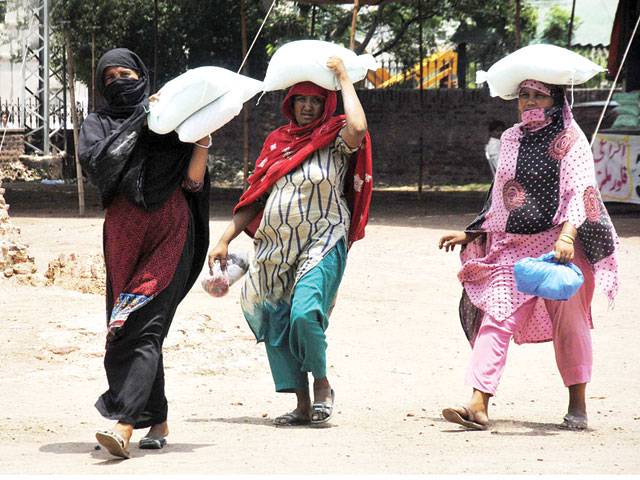ISLAMABAD/KARACHI - With the start of the holy month of Ramazan, rates of daily use items including meat, grocery and fruits have skyrocketed while the profiteers and hoarders seem busy to gain maximum profit.
Even senior officers and foreign diplomats complained about price hike in the federal capital. The prices of necessary commodities had already gone up to the sky before the start of Ramazan. Vegetables, fruits and all the basic commodities have witnessed 25 per cent to 30 per cent increase in their prices, increasing the burden on the troubled common man.
The prices of more than 40 daily use commodities including sugar, rice, pulses, chicken, beef, mutton, vegetables and fruit prices have also shot up. Like every year, the price control authority appears to have failed in controlling the prices.
The price lists issued by the local administration seems a showpiece in the shops since the shopkeepers are not following the rate lists on one or the other pretext. The wholesalers and retailers, particularly of fruits and vegetables, are enjoying a freehand and are fleecing the consumers in the holy month.
The price of sugar has gone up by Rs 5-10 per kilogram. Dates are available from Rs 180 to Rs1200 per kg while chicken is being sold at around Rs 340-380 per kg. Gram is regularly used in Ramazan and its price has soared to Rs 130 to Rs 180 per kg. Yogurt is being sold at Rs 90 to Rs 100 while one litre of milk costs Rs 80 to Rs 95. The prices of most of vegetables including potato, onion, ginger, ladyfinger, cauliflower, black pepper, lemon and cabbage registered an increase by 20 to 30 per cent.
In the same way, the prices of apple, peach, banana, mango, melon and other fruits have also increased. "It is a yearly routine that before the start of Ramazan, the shopkeepers increase the prices of fruit and vegetables which is unjustifiable and against the spirit of Islam."
Dr Aslam, a renowned physician and religious scholar of Islamabad, said that the price hike has made it impossible for the common man to run his kitchen. "Even in Ramazan the profiteers have no embarrassment," he added.
However, shopkeepers were of the view that they had nothing to do with price hike and contended that the prices in wholesale markets had increased. A shopkeeper of Aabpara Market, Nazir Khan, while talking to The Nation said, "The wholesalers are selling goods to us at a higher price and we can do nothing in this regard."
"The general sales tax has been increased and prices of petrol and electricity are high. When the cost of production increases, how can we keep the prices less," Raja Ahmed Abbass, a wholesaler in Raja Bazaar Rawalpindi commented.
Prices also remain very high at the so-called 'low-price' Sunday bazaars. A similar increase has been seen in the prices of kitchen items, the prices of which have been on the rise for the last three weeks.
The consumers complained that Sasta bazaars could only be useful if prices were checked by the administration and stern action be taken against the profiteers. "A price increase before the holy month and in Ramazan has become a trait in our society," said a resident of G-7 Islamabad Amir Hakeem. He said prices had been increasing for the last two weeks and nobody had taken steps to control them.
"Every year it's the same. The new federal government too has miserably failed to control the prices. How I make a budget of my home when every week you have to face new price of daily uses commodities," Nadia, a housewife, commented.
Silly, a Chinese origin student presently studying in Islamic University Islamabad, said the Sunday Bazaar were used to offer items at cheap rates before the Ramazan but now every thing's price has increased including food items. She lamented, "Prices are decreases during the religious days all over the world but we Muslims don't vacillate to increase the prices in our religious days."
As many as 40 fair shops and four sasta bazaars are set up by Islamabad Capital Territory (ICT) administration with the purpose to provide edible and foods item to the citizens at cheaper rates. The ICT administration claimed that the rates of food items at fair shops and sasta bazaars were lower than the rates of weekly bazaars and markets.
Saturday, May 18, 2024
Bizarre Ramazan bazaars

Pakistan, Saudi relations reaching new heights: Mohsin Naqvi
3:10 PM | May 18, 2024
YouTubers entry ‘banned’ in Parliament House
1:02 PM | May 18, 2024
Pakistan establishes first ‘Climate Change Authority’
12:58 PM | May 18, 2024
CM Maryam directs measures for land record digitalisation
12:29 PM | May 18, 2024
LWMC launches 15-day zero waste campaign in Lahore
May 18, 2024
Sports & Genocide
May 18, 2024
Healing AJK
May 18, 2024
A New World Order
May 18, 2024
Tobacco Toll
May 17, 2024
Rushed Reforms
May 17, 2024
Continuing Narrative of Nakba
May 18, 2024
Teacher Struggles
May 18, 2024
No Filers out of Reach
May 18, 2024
Hoax of Inflation Coming Down
May 17, 2024
Rising Inflation
May 17, 2024
ePaper - Nawaiwaqt
Advertisement
Nawaiwaqt Group | Copyright © 2024





